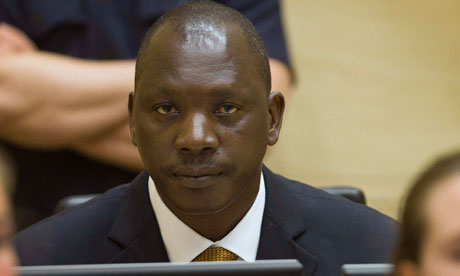By Tamara Alfred
Impunity Watch Reporter, Africa
The International Criminal Court concludes its first war crimes trial this week against Thomas Lubanga, a Congolese warlord.
Lubanga, 50, an ethnic Hema, was charged with enlisting and conscripting children as young as nine to his Union of Congolese Patriots (UPC) movement to kill members of the rival Lendu tribe during the civil war in the Democratic Republic of Congo. It was the first international case to focus exclusively on child soldiers and the opening trial at the world’s first permanent war crimes tribunal. Despite multiple setbacks, the conclusion of the two-year trial demonstrates the ICC’s ability to hear even the trickiest of cases.

“It is the first ICC trial finally coming to an end and it’s evidence that the ICC can conduct trials, despite the fact it has taken a considerably long time,” said Mariana Pena of the Federation for Human Rights in The Hague.
More than 30,000 child soldiers were recruited during the Democratic Republic of Congo’s civil war. Prosecutor Luis Moreno-Ocampo said that Lubanga’s armed group recruited “hundreds of children to kill, pillage and rape.”
Lubanga has denied all charges, saying he was a politician, not a warlord, and never played an active role in the UPC’s militia. His defense has argued that he is being tried as political scapegoat and that other leaders of the UPC and DRC bear greater responsibility. The defense also claims that Lubanga in fact tried to liberate child soldiers, not recruit them.
The defense has also alleged that child soldiers who testified invented stories and suggested that they had been coached or bribed to give false evidence. Additionally, the defense has also put forth major accusations of prosecutorial misconduct.
The trial was put on hold for six months in June 2008 – 10 days before it was scheduled to start – when judges ruled that Moreno-Ocampo had not given lawyers evidence that could have helped Lubanga, prompting criticism that Lubanga was not receiving a fair trial. The documents were later released on the condition of confidentiality to protect the sources; just one of the ways the ICC was forced during the trial to find ways of shielding witnesses while giving testimony, as well as figuring out how to share materials with the defense without endangering sources because the materials reveal their identities.
“Disclosure obligations are non-negotiable,” said Alison Cole of the Open Society Justice Initiative, “and there are positive signs that lessons with respect to evidence management are being internalized within the court.”
Judges again halted the trial in July 2010 and ordered Lubanga’s release when prosecutors defied a court order to reveal the identity of an intermediary who had helped them contact witnesses. Prosecutors appealed and Lubanga remained in custody. Prosecutors revealed the identity of their intermediary to the defense in the end and the trial continued.
Prosecution and defense lawyers will conclude their arguments on Thursday and Friday before the three-judge panel leaves to consider the verdict. A judgment is expected in early 2010 as the judges’ terms end in March.
The ICC is currently conducting three other trials, all of Congolese suspects, including the country’s former vice president Jean-Pierre Bemba.
More recently, the ICC has issued indictments in the Darfur conflict in Sudan and of Libya’s fallen leader Gaddafi, as well as his son Saif al-Islam and Libyan intelligence chief Abdullah al-Senussi on charges of crimes against humanity for their role in the killing of civilian protesters at the start of the recent uprising.
“I found that fear of the ICC a healthy development in international law,” Radhika Coomaraswamy, the UN special envoy for children in armed conflicts, told the Associated Press regarding the power of the ICC. “Nobody can measure how many children have been saved because of deterrence. That’s not something you can measure, but hopefully that will be the case.”
For more information, please see:
The Guardian – Judges urged to convict Congo warlord Thomas Lubanga – 25 August 2011
Voice of America – ICC’s First War Crimes Trial Comes to Close – 25 August 2011
Reuters – ICC’s landmark debut trial concludes after two years – 24 August 2011